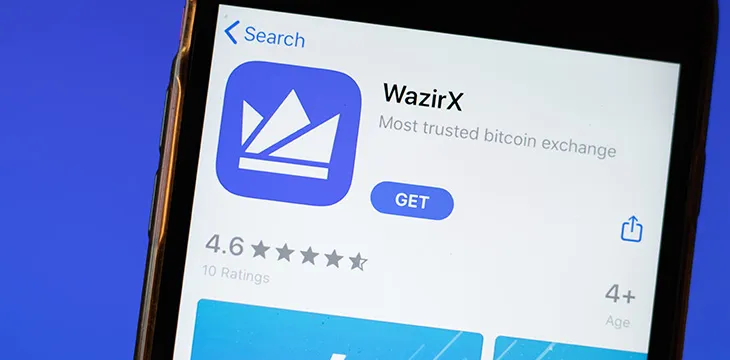|
Getting your Trinity Audio player ready...
|
Binance’s Indian offshoot WazirX has had its assets frozen by the country’s economic criminal investigation unit in yet another reputational blow to the scandal-plagued cryptocurrency exchange.
On Friday, India’s Enforcement Directorate (ED) announced that it had frozen Rs646,700,000 (US$8.15 million) in bank deposits belonging to Zanmai Lab Pvt Ltd, the operating company behind WazirX, under the Prevention of Money Laundering Act. The freeze stemmed from the ED’s investigation into “predatory” loan companies that reportedly used local crypto exchanges to launder their ill-gotten gains.
The ED’s investigation targeted a number of non-banking financial companies (NBFC) that were engaging in “predatory lending practices in violation of the [Reserve Bank of India] guidelines and by using tele-callers who misuse personal data and use abusive language to extort high interest rates from the loan takers.”
“Various fintech companies backed by Chinese funds” that were unable to procure NBFC licenses struck deals with “defunct NBFCs to piggyback on their licenses.” The ED said a “large amount of funds were diverted by the fintech companies to purchase crypto assets and then launder them abroad.” The bulk of the laundered cash was funneled through WazirX and “diverted to unknown foreign wallets.”
The ED noted that Zanmai Labs created “a web of agreements” with companies–including Binance (Cayman Islands)–to “obscure the ownership of the crypto exchange.” Zanmai officials reportedly gave “contradictory & ambiguous answers” regarding Binance’s role in WazirX’s day-to-day operations in order to “evade oversight by Indian regulatory agencies.”
Furthermore, despite “repeated opportunities,” WazirX failed to perform the necessary ‘know your customer’ (KYC) requirements on exchange transactions. “Prior to July 2020, they did not even record the details of the bank account from which funds were coming into the exchange to purchase crypto assets. No physical address verification is done. There is no check on the source of funds of their clients. No [enhanced due diligence] is done. No [suspicious transaction reports] were raised.”
WazirX director Sameer Mhatre has “complete remote access” to the exchange’s database but reportedly refused to hand over details of the suspect accounts to the ED. In the ED’s view, “the lax KYC norms, loose regulatory control of transactions between WazirX & Binance, non-recording of transactions on blockchains to save costs and non-recording of the KYC of the opposite wallets has ensured that WazirX is not able to give any account for the missing crypto assets.”
Friday’s news followed media reports earlier this week quoting Ministry of Finance officials saying the ED was probing WazirX/Binance for suspected violations of the Foreign Exchange Management Act. The Ministry stated the “all crypto transactions between these two exchanges were not being recorded on the blockchains and were thus cloaked in mystery.”
The ED gave off signals last month suggesting that some kind of action was imminent but Friday’s action is hardly the first time WazirX has raised the ire of Indian authorities. One year ago, the ED was probing WazirX for allegedly assisting Chinese-run online sports betting operations looking to funnel hundreds of millions of dollars of illegal gambling proceeds out of the country. This January, the exchange was accused of failing to remit over $5 million in taxes owed to the state.
Were you lying then or are you lying now?
Incredibly, Binance’s perpetually veracity-challenged boss Changpeng ‘CZ’ Zhao is now claiming that his company’s 2019 acquisition of WazirX “was never completed,” despite a Binance blog post at the time which stated that it had “acquired” WazirX and an April 2021 tweet in which CZ referred to WazirX as “Binance-owned.”
Zanmai Labs managing director Nischal Shetty, who was named in the ED’s asset-freezing announcement, swiftly refuted CZ’s tweets in his own thread, stating unequivocally that “WazirX was acquired by Binance” and “WazirX is still owned by Binance.” Also, “Binance has all the Crypto assets” and “Binance has all the Crypto profits.”
CZ attempted to claim that Binance “only provides wallet services” for WazirX and that Zanmai is supposed to handle KYC and other regulatory irritants. Which seems perfectly on-brand, given Binance’s notorious disinterest in performing any KYC or anti-money laundering (AML) requirements that would negatively impact its revenue, all the while loudly proclaiming its commitment to being a good corporate citizen in every jurisdiction in which it operates (but conveniently never establishing a physical presence that might lead to arrests).
Trendspotting
In just the past few months, Binance has been fined millions for violating Dutch financial regulations, urged to stop operating without a license in the Philippines, accused of violating U.S. economic sanctions against Iran and laundering billions in illicit funds.
More recently, Binance was among the four exchanges cited in the £9.9 billion class action lawsuit filed this week in the U.K. by BSV Claims Ltd. The suit was brought on behalf of Bitcoin SV investors who took a financial hit following the collective decision by Binance, Bittylicious, Kraken and Shapeshift to delist BSV in 2019. The suit also alleges that the delistings were intended to damage BSV’s reputation and derail its growing public acceptance.
Lord David Currie of Marylebone, the inaugural Chair of the U.K.’s Competition and Markets Authority, said he agreed to serve as director of BSV Claims Ltd based on his belief that “competition law applies in the sphere of crypto assets in the same way that it does to other economic activities” and that BSV holders “deserve to be protected from anti-competitive behavior.”
When it rains…
In even more recent negative Binance news, Forbes reported Thursday that “every U.S. crypto exchange—and the largest crypto exchange in the world, Binance—are in various stages of being investigated” by the U.S. Securities and Exchange Commission (SEC).
(Binance has a U.S. offshoot that was intended to offer a patina of compliance that would hopefully distract regulators from the mothership’s vastly more blatant disregard for the law. However, it seems the Forbes reference is to Binance.com rather than Binance.US.)
In June, Bloomberg reported that the SEC was probing whether BNB, the in-house token Binance issued in 2017 to help fund the launch of its exchange, meets the definition of an unregistered security under U.S. law. The SEC has taken a greater interest in investigating exchanges such as Coinbase for selling unregistered securities following a recent insider trading scandal involving some of the sketchier function-free tokens that Coinbase has seen fit to list.
The Forbes report relied on an unidentified staffer from Sen. Cynthia Lummis’ office but the non-specificity of the info surrounding the SEC’s probes could simply be a way of furthering the senator’s preferred crypto messaging. In June, Lummis co-sponsored legislation that would hand most oversight of crypto assets to the SEC’s rival, the Commodity Futures Trading Commission (CFTC).
Crypto bros are all in favor of the CFTC taking point on this issue, in large part because it’s a much smaller agency than the SEC, with a similarly less-potent investigative branch. A brand new Senate bill that would grant the CFTC “the authority to regulate the trading of digital commodities” immediately met the approval of FTX wunderkind Sam Bankman-Fried, who tweeted that it was “really inspiring” to see elected officials kowtowing to the boy on the beanbag chair.
The pro-crypto pols’ criticism of the SEC is that the lack of bespoke regulations addressing ‘crypto’ means the agency has been ‘regulating through enforcement,’ leaving exchanges like Coinbase, FTX and Binance uncertain of how to conduct themselves. Apparently, in the interim, they’ve basically decided they can just run amok. And hey, if they get caught doing something really bad, they’ll just say someone else owns them.
Follow CoinGeek’s Crypto Crime Cartel series, which delves into the stream of groups from BitMEX to Binance, Bitcoin.com, Blockstream, ShapeShift, Coinbase, Ripple,
Ethereum, FTX and Tether—who have co-opted the digital asset revolution and turned the industry into a minefield for naïve (and even experienced) players in the market.

 04-10-2025
04-10-2025 





